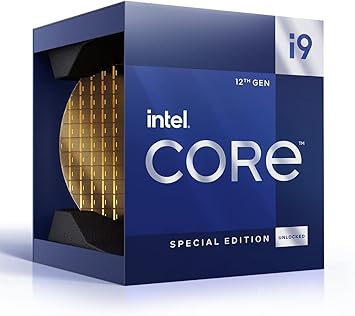Intel Core i9-12900KS

The Intel Core i9-12900KS is a high-performance processor from the 12th Generation Intel® Core™ series, featuring 16 cores and 24 threads, with a base clock of 3.40 GHz and a maximum boost clock of 5.50 GHz. It supports a maximum memory capacity of 128 GB and offers both PCIe 5.0 and 4.0 connectivity, making it an excellent choice for demanding applications and gaming.
Popularity: Low
Performance:
Specifications:
Model: Intel Core i9-12900KS
Series: 12th Generation Intel® Core™ i9 Processors
Architecture: Alder Lake
Socket: 1700
Cores: 16
Threads: 24
Base Clock: 3.40 GHz
Max. Boost Clock: 5.50 GHz
L2 Cache: 14 MB
L3 Cache: 30 MB Intel® Smart Cache
TDP: 150 W
Power Consumption: 241.0 W
Max Memory: 128 GB
Max Memory Speed: Up to DDR5 4800 MT/s; Up to DDR4 3200 MT/s
Max Temp: 90 °C
PCI Express Version: 5.0 and 4.0
PCIe Lanes: 20
Overclocking:
Integrated GPU: Yes
Cooler Boxed: no
Instruction Set: 64-bit
Launch Date: Q1'22
Manufacturer Page: Link
Review
The Intel Core i9-12900KS is a flagship processor in the Alder Lake series, representing Intel's dedication to high-performance computing. With 16 cores and 24 threads, this CPU is designed for enthusiasts who demand the best in multitasking and gaming performance. This review will dive deep into its capabilities, benchmarks, and real-world performance to determine if it truly stands out.
Technical Specifications and Features
- Architecture: Alder Lake
- Cores/Threads: 16/24
- Base/Max Boost Clock: 3.4 GHz / 5.5 GHz
- Integrated Graphics: Intel® UHD Graphics 770
- PCIe Support: PCIe 5.0 and 4.0
- Memory Support: Up to DDR5 4800 MT/s and DDR4 3200 MT/s
- Power Usage: 150 W to 241 W during heavy use
Boasting many advanced features [Intel], it integrates Thermal Velocity Boost and Adaptive Boost technologies, allowing it to reach impressive speeds. However, such prolific specs come at a high thermal cost, demanding robust cooling solutions to prevent throttling down its performance.
Performance and Benchmarks
In terms of raw performance, benchmarks reveal the Core i9-12900KS outperforms its predecessor, the Core i9-12900K, by approximately 4% in single-threaded applications, largely thanks to a 300 MHz boost in clock speed. This boost places it at the top of the chart for gaming CPUs, rivaling the AMD Ryzen 9 5950X's multi-thread performance. The chip's prowess in simulation tasks was apparent, although it struggled against the Ryzen 7 5800X3D in certain scenarios [AnandTech].
Further testing at TechPowerUp found that while the gains over its predecessor might seem marginal, the Core i9-12900KS excels in IPC (instructions per cycle) performance due to the new Golden Cove architecture, even challenging the Ryzen’s gaming performance at lower resolutions.
Overclocking and Cooling
Teams at Tom's Hardware highlighted the 12900KS's remarkable overclocking capabilities, achieving an unheard-of 7.8 GHz with liquid nitrogen cooling. They did, however, confirm that even conventional water cooling was insufficient to prevent thermal throttling under typical workloads. This constraint necessitates advanced cooling solutions for sustained heavy usage, although for everyday use, gamers might not need to reach such extreme measures.
Value and Pricing
The MSRP has positioned the Intel Core i9-12900KS in a luxury niche, with its $750 price point becoming a point of contention amongst reviewers. PCMag UK suggests the price hardly justifies the present advantage over the Core i9-12900K, being better suited for those who need every ounce of its power, and can supplement it with a compatible GPU and cooling setup.
Conclusion
The Intel Core i9-12900KS is undoubtedly one of the fastest processors on the market, offering more than enough power for any task. However, its steep requirements, both in terms of budget and cooling, make it best suited for enthusiasts and professionals who will make full use of its capabilities. Other consumers may find its sibling, the Core i9-12900K, or AMD’s alternatives, offer better value and more practical use-case scenarios.